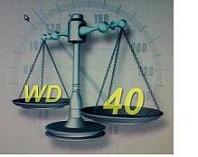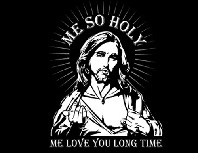Equal Rights for the LGBT Community?
Re: Equal Rights for the LGBT Community?
Of course Matt took that out of context and without reading the entire chapter from where that verse came from it was actually a punishment for the offender to atone for his crimes against the virgin and her family. If you actually read this book you might have a greater understanding.
-

mrjamwin - SWBF2 Admin
- Posts: 1087
- Joined: Fri Sep 04, 2009 2:27 am
Re: Equal Rights for the LGBT Community?
Mandalore wrote:I'm not sure if Koko is being sarcastic or not.
Sometimes yes, sometimes no.
Mandalore wrote:Surely everyone here realizes that population is most definitely not an issue for the human race.
The main social role of the marriage and the family at all is preserving the population. Therefore innability to breed is considered an issue.
Mandalore wrote:And Koko, Matt's showing you that the Bible is full of [poo].
All Matt has showed is how some man can twist the Holly Bible texts. This is all about the lack of respect our society shows at all. There's nothing holly in your world, right ?
mrjamwin wrote:Of course Matt took that out of context and without reading the entire chapter from where that verse came from it was actually a punishment for the offender to atone for his crimes against the virgin and her family. If you actually read this book you might have a greater understanding.
For once I must agree with jamwin.
Retired member of SWGO 2006~2011.
-

KOko - Community Member
- Posts: 1079
- Joined: Tue Aug 18, 2009 1:10 pm
Re: Equal Rights for the LGBT Community?
mrjamwin wrote:Of course Matt took that out of context and without reading the entire chapter from where that verse came from it was actually a punishment for the offender to atone for his crimes against the virgin and her family. If you actually read this book you might have a greater understanding.
also to add.
ive noticed that this part is diffrent depending from wich bible.
In one bible ive read that this verse says the man rapes the woman.
while in another bible it dictates he seices her.
this meaning the woman implacted willingly lay whith him.
So this means when a man and a woman in those times had sex and werent married the man had to pay 50 sicles to her father and marry her forever.
How do i feel on a daily basis?
Spoiler: show
-

(SWGO)Minas_Thirith - SWBF2 Admin
- Posts: 3483
- Joined: Mon Aug 23, 2010 8:10 pm
- Location: On the RM just about to ban you.
- Steam ID: MTminas
- Origin ID: SWGO-Exeon
Re: Equal Rights for the LGBT Community?
Me twist the text, give me a break!
I see the opinions of some are: take the meaning to be good = true meaning, take anything to be bad = wrong/twisted meaning.
Can every Christian here just admit that there is some seriously stupid, wrong, outdated crap in the bible, especially the old testament?
Also - I did 11 years of Catholic school, mass twice a week for eighteen years, my parents are big players in the church, Mom was a missionary, I taught bible study to public school kids while in high school, and I have the books of the bible memorized and I've read it in class, mass, with study groups, parents, and on my own maybe 14 times cover to cover. That's WHY I'm an atheist, well that and learning more theology and how the books for the new testament were written and chosen for the bible.
I see the opinions of some are: take the meaning to be good = true meaning, take anything to be bad = wrong/twisted meaning.
Can every Christian here just admit that there is some seriously stupid, wrong, outdated crap in the bible, especially the old testament?
Also - I did 11 years of Catholic school, mass twice a week for eighteen years, my parents are big players in the church, Mom was a missionary, I taught bible study to public school kids while in high school, and I have the books of the bible memorized and I've read it in class, mass, with study groups, parents, and on my own maybe 14 times cover to cover. That's WHY I'm an atheist, well that and learning more theology and how the books for the new testament were written and chosen for the bible.
Politeness is a discipline that compels respectful behavior. Morality is like a politeness of the soul, an etiquette of the inner life, a code of duties, a ceremonial of the essential.
-

Matt-Chicago - Dictator
- Posts: 2449
- Joined: Sun Aug 16, 2009 11:11 pm
- Xfire: mattinchicago
Re: Equal Rights for the LGBT Community?
Matt-Chicago wrote:
Also, don't forget you can have your wife stoned to death if the sheets don't get bloody on your wedding night.
BTW the picture is a fake. The whole sign is weathered to near a pile of rust, but the text pristine white. Nope. Also the angle of the text in relation to the viewing angle is just slightly off. (most noticeable from the left side)
“The hardest thing to explain is the glaringly evident which everybody has decided not to see.”
“You can avoid reality, but you cannot avoid the consequences of avoiding reality.”
"Freedom (n.): To ask nothing. To expect nothing. To depend on nothing."
“You can avoid reality, but you cannot avoid the consequences of avoiding reality.”
"Freedom (n.): To ask nothing. To expect nothing. To depend on nothing."
- ProfessorDreadNaught
- Community Member
- Posts: 247
- Joined: Mon Oct 19, 2009 1:01 pm
Re: Equal Rights for the LGBT Community?
I assumed it was fake and a lampoon of all those real billboards with bible quotes signed "-God"
Politeness is a discipline that compels respectful behavior. Morality is like a politeness of the soul, an etiquette of the inner life, a code of duties, a ceremonial of the essential.
-

Matt-Chicago - Dictator
- Posts: 2449
- Joined: Sun Aug 16, 2009 11:11 pm
- Xfire: mattinchicago
Re: Equal Rights for the LGBT Community?
Matt-Chicago wrote:Me twist the text, give me a break!
I see the opinions of some are: take the meaning to be good = true meaning, take anything to be bad = wrong/twisted meaning.
Can every Christian here just admit that there is some seriously stupid, wrong, outdated crap in the bible, especially the old testament?
Also - I did 11 years of Catholic school, mass twice a week for eighteen years, my parents are big players in the church, Mom was a missionary, I taught bible study to public school kids while in high school, and I have the books of the bible memorized and I've read it in class, mass, with study groups, parents, and on my own maybe 14 times cover to cover. That's WHY I'm an atheist, well that and learning more theology and how the books for the new testament were written and chosen for the bible.
Well..Here's the rub. Many of the books of the Bible were written a generation, sometimes many 'Generations' after the event occurred. Now, I'm not Biblical Scholar, and cannot say I'm as knowledgeable of the Bible as Matt is. But I am a Christian, and I believe in Jesus as the Son of God, and His resurrection. Now, I totally understand where Matt is coming from, Matt is obviously a very 'factual' kinda guy. I am too, because I want facts. But unlike Matt, I have chosen to rely more on my inner Faith, not the details and inconsistencies and hypocritical passages which are contrary to teachings between the Old and the New Testaments. A person could drive themselves crazy of these issues. I, too, have questioned certain things in the Old testament, and whether or not it was righteous...but right or wrong in my eyes, I don't question God's authority. I have chosen to accept the New Testament as my guide. The Old Testament was the OLD Law, the New Testament is the NEW Law. Remember, 'Humans' wrote these books, and 'Humans' chose to put in the Torah/Bible what are written in them, 'inspired' by God…but not 'written' by God and not Jesus. It's just 'Faith' for me…you either feel and have it, or you don't.
Now what follows, was something I found, but not written by me. It is a fair, general explanation of how the Bible came to be (for those that don't already know, and what Matt referenced he was doing learning about its' history). Whether or not the books were genuinely 'inspired by God', is for each person to decide for themselves. Remember, if you rely too heavily on 'facts' and not enough on 'faith', you will fall short, and you will never acquire the inner peace required to be a Christian. It doesn't mean that you are not 'loved' by God, whether or not you choose to believe in Him…He believes in 'you'. Anyway, I'm off my soap box…here it is:
---"The term “canon” is used to describe the books that are divinely inspired and therefore belong in the Bible. The difficulty in determining the biblical canon is that the Bible does not give us a list of the books that belong in the Bible. Determining the canon was a process conducted first by Jewish rabbis and scholars and later by early Christians. Ultimately, it was God who decided what books belonged in the biblical canon. A book of Scripture belonged in the canon from the moment God inspired its writing. It was simply a
 er of God’s convincing His human followers which books should be included in the Bible.
er of God’s convincing His human followers which books should be included in the Bible.Compared to the New Testament, there was very little controversy over the canon of the Old Testament. Hebrew believers recognized God’s messengers and accepted their writings as inspired of God. While there was undeniably some debate in regards to the Old Testament canon, by A.D. 250 there was nearly universal agreement on the canon of Hebrew Scripture. The only issue that remained was the Apocrypha, with some debate and discussion continuing today. The vast majority of Hebrew scholars considered the Apocrypha to be good historical and religious documents, but not on the same level as the Hebrew Scriptures.
For the New Testament, the process of the recognition and collection began in the first centuries of the Christian church. Very early on, some of the New Testament books were being recognized. Paul considered Luke’s writings to be as authoritative as the Old Testament (1 Timothy 5:18; see also Deuteronomy 25:4 and Luke 10:7). Peter recognized Paul’s writings as Scripture (2 Peter 3:15-16). Some of the books of the New Testament were being circulated among the churches (Colossians 4:16; 1 Thessalonians 5:27). Clement of Rome mentioned at least eight New Testament books (A.D. 95). Ignatius of Antioch acknowledged about seven books (A.D. 115). Polycarp, a disciple of John the apostle, acknowledged 15 books (A.D. 108). Later, Irenaeus mentioned 21 books (A.D. 185). Hippolytus recognized 22 books (A.D. 170-235). The New Testament books receiving the most controversy were Hebrews, James, 2 Peter, 2 John, and 3 John.
The first “canon” was the Muratorian Canon, which was compiled in A.D. 170. The Muratorian Canon included all of the New Testament books except Hebrews, James, and 3 John. In A.D. 363, the Council of Laodicea stated that only the Old Testament (along with the Apocrypha) and the 27 books of the New Testament were to be read in the churches. The Council of Hippo (A.D. 393) and the Council of Carthage (A.D. 397) also affirmed the same 27 books as authoritative.
The councils followed something similar to the following principles to determine whether a New Testament book was truly inspired by the Holy Spirit: 1) Was the author an apostle or have a close connection with an apostle? 2) Is the book being accepted by the body of Christ at large? 3) Did the book contain consistency of doctrine and orthodox teaching? 4) Did the book bear evidence of high moral and spiritual values that would reflect a work of the Holy Spirit? Again, it is crucial to remember that the church did not determine the canon. No early church council decided on the canon. It was God, and God alone, who determined which books belonged in the Bible. It was simply a
 er of God’s imparting to His followers what He had already decided. The human process of collecting the books of the Bible was flawed, but God, in His sovereignty, and despite our ignorance and stubbornness, brought the early church to the recognition of the books He had inspired."
er of God’s imparting to His followers what He had already decided. The human process of collecting the books of the Bible was flawed, but God, in His sovereignty, and despite our ignorance and stubbornness, brought the early church to the recognition of the books He had inspired."-

WD-40 - SWBF2 Admin
- Posts: 4537
- Joined: Mon May 17, 2010 10:12 pm
- Location: Likely on some crappy Hotel internet connection
- Xfire: faststart0777
Re: Equal Rights for the LGBT Community?
WD-40 wrote:
Remember, if you rely too heavily on 'facts' and not enough on 'faith', you will fall short, and you will never acquire the inner peace required to be a Christian.
If you base things off of blind faith rather than off of evidence, you will fall short.
I also noticed that that huge post you made was your 666th post, WD.

"Isn't it enough to see that a garden is beautiful without having to believe that there are fairies at the bottom of it too?"
-Douglas Adams.
-Douglas Adams.
-

Corpse - SWBF2 Admin
- Posts: 2540
- Joined: Wed Aug 26, 2009 9:49 am
- Steam ID: rottencorpse94
- Origin ID: Fupa_iAm
Re: Equal Rights for the LGBT Community?
Matt-Chicago wrote:Me twist the text, give me a break!
You? Who talks here about you, you selfish-midlife crisis-amertican ?
I said that you posted a picture about how a man can twist the words of God.
Atheists will find it funny. Christians will find it harassing their belief.
The most casual mistake many of you do here is to mess Religion with belief. Religion has nothing to do with the BiIble or God. It's just an organisation of spiritual type.
Belief is what makes you believe that Holly Bible is the words of God. Some of them definitely outdated and should be read with the understanding about what was the society a few thousand years ago.
Belief is what will make you follow Jesus to his teachings. All of them prety up-to-date. But thats why he was sent here, to replace the old testament, right ?
It should be the biggest hypocrisy ever - the fighters for human rights are questioning my right to believe in God and are insulting what I believe in! Why? To justify gay marriage!
Retired member of SWGO 2006~2011.
-

KOko - Community Member
- Posts: 1079
- Joined: Tue Aug 18, 2009 1:10 pm
Re: Equal Rights for the LGBT Community?
Corpse wrote:WD-40 wrote:
Remember, if you rely too heavily on 'facts' and not enough on 'faith', you will fall short, and you will never acquire the inner peace required to be a Christian.
If you base things off of blind faith rather than off of evidence, you will fall short.
I also noticed that that huge post you made was your 666th post, WD.
OMG! That is too funny!...How ironic!
Well...Now it's 667, since I posted this reply



Regarding my faith...it's not 'blind' faith. For Jesus to have accomplished all the things that were prophesied that the Christ would accomplish in the Old Testament, it was astronomically impossible for just one man to do so...but Jesus did. 'Blind' Faith?...NO!
Now, Corpse...you missed my point, but I'll re-explain my position. If I were to wait till 'pure factual evidence' of Old/New testament teachings came to be, given the un-reliable and bio-degradable ancient ways and capabilities of cataloging and preserving 'evidence', and compare that to our modern day 'very' capable ways of doing so, I would never find 'all' that I wanted to find and need to convince me. Scientific minds want pure evidence to convince them 'beyond a resonable doubt'...'Spiritual' minds do not...that's called 'Faith'...not 'blind' faith...just Faith...because to me, Jesus existed and he accomplished all that the New Testament said he had accomplished.
Now, Matt claims to be 'Atheist'. Given what his parents have accomplished, his upbringing, and specifically the enormous amount of time Matt devoted to Church and to the Bibles teachings, if not a Christian, I figured Matt would lean more toward 'Agnostic' than a full blown Atheist...unless it's more of a combination given he still seeks the truth, versus the 'God simply does not exist' phylosophy...so Matt?
-

WD-40 - SWBF2 Admin
- Posts: 4537
- Joined: Mon May 17, 2010 10:12 pm
- Location: Likely on some crappy Hotel internet connection
- Xfire: faststart0777
Return to Non-Game Discussions
Who is online
Users browsing this forum: No registered users and 33 guests
